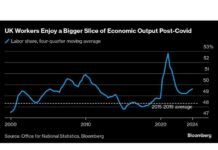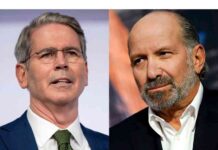President Donald Trump took to social media to express his frustration with retail giant Walmart, urging the company to absorb the costs of his tariffs rather than passing them on to consumers. As Trump continues to escalate import taxes, he has faced skepticism regarding his claims that foreign producers would bear the brunt of the tariffs. Most economic analyses have cast doubt on these assertions, warning of increased inflation as a result of the trade penalties. Walmart, in response, issued a warning that prices on various products, from bananas to children’s car seats, could see a hike.
In a post on Truth Social, Trump criticized Walmart for considering price increases in response to the tariffs, insisting that the company, alongside China, should shoulder the additional costs. With Walmart employing 1.6 million people in the United States, Trump called on the retailer to prioritize his economic agenda over profits, emphasizing the potential benefits for domestic manufacturing jobs in the long run. Despite the president’s stance, many major American companies find themselves in a difficult position due to the tariffs, facing the dilemma of maintaining sales amid rising costs or risking Trump’s disapproval.
The impact of Trump’s tariffs extends beyond just Walmart, with the tariffs contributing to a decline in consumer sentiment. The University of Michigan survey of consumer sentiment revealed a significant drop, with a majority of respondents expressing concerns about inflation due to the tariffs. Walmart’s CFO, John David Rainey, highlighted the challenges faced by retailers in absorbing these additional costs, citing a potential 29% price increase on car seats made in China. While the administration has recently reduced tariffs on China, tensions persist with other major trading partners like Mexico and Canada, further complicating the trade landscape.
Despite the ongoing trade tensions and economic uncertainties, Trump remains steadfast in his commitment to imposing tariffs on various products. From autos to steel and aluminum, the administration’s tariff policies continue to shape the economic landscape, prompting reactions from both domestic companies and international trading partners. As the debate over tariffs continues, the implications for consumers, businesses, and the overall economy remain uncertain, underscoring the complexities of global trade in the current political climate.






















